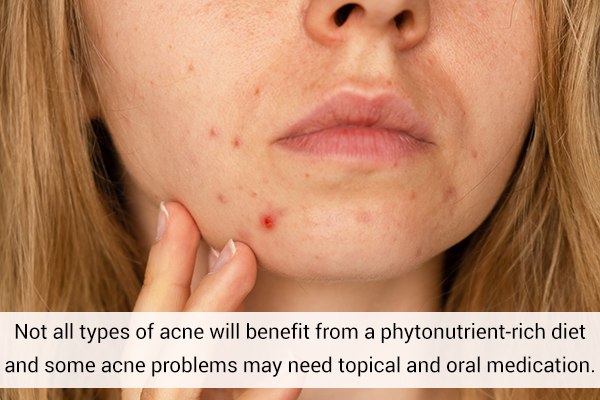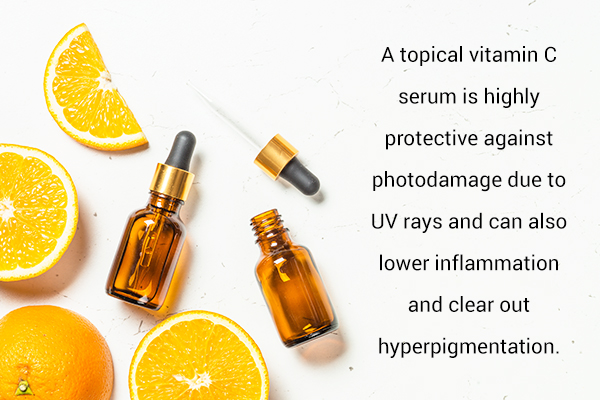In this article:
It is a well-known saying that “you are what you eat.” It is rightly said, because the food you eat not only affects your inner well-being but also shows on your skin.

Phytonutrients present in plant-based foods act as antioxidants that benefit the skin in a variety of ways. According to experts, phytonutrient-rich foods are the key to healthy and glowing skin.
This article will discuss the advantages of phytonutrients for the skin as well as the foods you can consume to obtain these benefits.
Skin Benefits of Phytonutrients
Here are some properties of phytonutrients that may help to get healthy skin.
1. Treats inflammatory conditions
Although medications are needed to manage and treat immune-mediated and inflammatory skin conditions, the role of nutrition cannot be understated.
A diet rich in phytonutrients that act as antioxidants, such as carotenoids from carrots and pumpkin, can lower inflammation, and this can benefit skin conditions such as psoriasis, atopic dermatitis, bullous disease, and alopecia areata. (1)
Include foods such as turmeric, tomatoes, watermelon, grapes, raspberries, blueberries, carrots, and dark green leafy vegetables in your diet to manage inflammatory skin conditions. (2)
2. May help clear acne

Acne is another inflammatory skin condition that affects a large population.
Multiple human studies have found phytonutrients such as resveratrol, myricitrin, alpha-mangostin, curcumin, and catechins to benefit acne. These phytonutrients reduce the inflammation associated with acne, reduce sebum (oil) production on the skin, and exert anti-androgenic effects (reducing male hormones associated with acne production). (3)
Include foods like green tea, berries, turmeric, mangosteen, and grapes in your diet to curb acne.
However, it is important to note that not all types of acne will benefit from a phytonutrient-rich diet and some acne problems may need topical and oral medication.
3. Fights aging
The skin, the largest organ of the human body, is made up of collagen, and its production reduces as age increases. This decline causes fine lines and wrinkles to appear on the skin, making it look old and saggy. (2)
Phytonutrients including those from tea and turmeric, resveratrol from grapes, silymarin from milk thistle, and flavonoids from green leafy vegetables, apples, cherries, and citrus are particularly beneficial in delaying aging fruits when consumed via the diet. (4)
Some of these polyphenols are also used topically. However, this application is still being studied and needs more research to corroborate its effectiveness.
4. Protects against UV-induced damage
Lately, skin changes due to UV exposure have become a hot topic in the skin care industry. Constant and unprotected exposure to the harsh sun can cause changes to the skin’s matrix, increase inflammation and oxidative stress, and even leads to the development of skin cancer. (5)
Phytonutrients such as flavonoids from green leafy vegetables, apples, grapes, and onions; carotenoids from carrots, pumpkin, yellow squash, and other yellow-orange vegetables; lycopene from tomatoes and watermelon; alpha-tocopherol from almonds; and those found in cocoa and green tea have been well-studied for their role in protecting the skin from photodamage. (5)
These phytonutrients can be consumed orally, or the extract can be applied to the skin. However, consulting a dermatologist is still highly recommended before using anything for skin care.
5. Can prevent skin cancers
As discussed above, changes to the skin matrix due to UV exposure or chronic inflammation can lead to cancerous changes in the skin. Phytonutrients in foods have been known to protect the skin against such changes and ultimately prevent the risk of cancer development. (6)
Experts recommended eating whole fruits such as apples, watermelon, grapes, bananas, citrus fruits, peaches, pears, blueberries, and pineapples, consuming green leafy vegetables, and drinking green tea for prevention. (6)
Is Applying a Topical Vitamin C Serum Good for the Skin?

A topical vitamin C serum is highly protective against photodamage due to UV rays and can also lower inflammation and clear out hyperpigmentation. However, it is a vitamin and not a phytonutrient.
You can consult your dermatologist to identify a suitable treatment for your skin concerns.
Practical Takeaways
- Phytonutrients play a protective role in the skin by lowering inflammation, reducing oxidative stress, protecting the integrity of collagen, and preventing damage and cancerous changes to skin cells.
- Multiple studies have identified foods such as citrus fruits, watermelon, tomato, berries, bananas, green leafy vegetables, green tea, cocoa, apples, pears, and cherries, among others, as significant sources of phytonutrients.
- Was this article helpful?
- YES, THANKS!NOT REALLY


